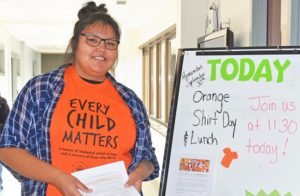Advocating for Indigenous Rights on Orange Shirt Day at Nipissing University

NORTH BAY—The Enji Giigdoyang Student Lounge was packed full of students in orange t-shirts the Thursday before Orange Shirt Day. Nipissing University’s Office of Indigenous Initiatives invited the students for a luncheon gathering to commemorate the dark legacy of the Residential School system.
Just outside of the lounge, student Jo-Marie Einish welcomed questions from students about Orange Shirt Day. She gave students friendly invites into the gathering for lunch. She also offered an orange t-shirt to them to wear on September the 30 to show respect.
Einish is passionate about helping people become aware about Canada’s real history and Indigenous reality. She is of the Whapmagoostui First Nation from Great Whale River.
“I’m in my fourth year of political science. I will advocate for Indigenous rights. I’ll advocate in any way. As an Indigenous person, there is a lot of hurt that happened to Indigenous people. The more you can educate people about it, the more that they will see, it’s not something that people can just get over. People are still affected by it. There is intergenerational trauma.”
Einish says creating awareness is of the utmost importance.
“There are people that come to school here that can’t even speak their language, but they still try to find the best way possible to help their communities. That’s why people come to school. Not a lot of people know what the impact is of Residential Schools. Bringing awareness is a really good step for people to be educated more on this topic.”
The political science students say it is shocking to hear the stories about what actually happened.
“If people are more aware of it, there could be a lot of better outcomes for Indigenous people, because they face a lot of racism. They feel like outcasts.”
Einish was asked if she has experienced racism.
“Oh, definitely,” she replied. “But not here. I find at school here, if you are friendly to people, people will be friendly to you.”
Einish has faced racism in big cities.
“In major cities, I get told, ‘Hey, you’re dirty.’ You are given that stereotype.”
In the hallway beside the Enji Giigdoyang Student Lounge, Einish held out a flyer to a man in a hurry. He stopped and asked about her orange shirt.
“We are acknowledging the Residential School Survivors,” she replied.
“My grandmother went to Residential School actually,” noted the man. “I’ll come by again soon.”
After her education is complete, Einish wants to fill the gaps in unstable funding for important programs for youth. She saw the problem when she worked as an outreach worker.
“I did see that when you are an outreach worker you want to do more things for the youth but there is a lack of funding. How are you going to reach out to youth and get youth to trust you and then all of a sudden, the program ends?”
Events to acknowledge the fifth Orange Shirt Day in Canada can be somber. It is a day for discussions and reflection on the effect the Indian Residential School system on Indigenous lives – then and now.
Orange Shirt Day grew from the story of Phyllis Webstad. Webstad is Northern Secwepemc (Shuswap) from the Stswecem’c Xgat’tem First Nation (Canoe Creek Indian Band). She comes from mixed Secwepemc and Irish/French heritage and lives in Williams Lake, BC.
When she was six-years-old, Webstad had her enthusiasm for her new school taken from her along with her brand-new orange shirt her grandmother had saved up for. Upon arrival to her new school, her shirt was taken from her and she never saw it again.
September was the month selected to mark Orange Shirt Day as September is the month the RCMP would show up in First Nation, Métis, and Inuit territories to take children from their families, communities, language and culture.
This September 28, Phyllis Webstad wrote in a Facebook post on the page Orange Shirt Day – Every Child Matters.
“Today is my grandmother Lena’s 100th Birthday! Yes, the same one that bought me that shirt in 1973. Granny eats well so as long as she is eating she will be here with us. She no longer knows us but knows that we are her people. We will be celebrating her birthday on Sunday, October 7th in Williams Lake, BC. My mother is coming with me to be with her mother on this special day. Think of granny Lena today at your Orange Shirt Day events. Even though I cannot personally attend all events, know that you are keeping the conversation alive on all aspects of Residential School and that is the intent of Orange Shirt Day, so Kukstemcw, thank you! Much love and hugs to all – Phyllis W.”


